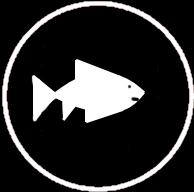Pacific hagfish
Eptatretus stoutii
Where is it found?
Deep marine environments
Diet and foraging method
Key adaptations
Hagfish don't have jaws, but instead have rasps on their tongue to attach themselves onto dying or dead marine animals. They then tie themselves in knots when attached to animals to gain leverage and tear off chunks of flesh.
They have a ring of sensitive tentacles around their mouth which they use to sense their environment.
Hagfish can produce large amounts of slime when threaten by a predator, and often this slime allows them to escape unharmed.
They have a ring of sensitive tentacles around their mouth which they use to sense their environment.
Hagfish can produce large amounts of slime when threaten by a predator, and often this slime allows them to escape unharmed.
Social organisation and mating system
N/A
Did you know that...?
The slime produced by Hagfish has a remarkable structure and when it has been dried out, it can be made into clothing! Hagfish are also the only animals that have a skull but no vertebral column.
Taxonomy
Picture credits:
"Eptatretus stoutii 1" by Stan Shebs. Licensed under CC BY-SA 3.0 via Wikimedia Commons - https://commons.wikimedia.org/wiki/File:Eptatretus_stoutii_1.jpg#/media/File:Eptatretus_stoutii_1.jpg
"Eptatretus stoutii heads" by Stan Shebs. Licensed under CC BY-SA 3.0 via Wikimedia Commons - https://commons.wikimedia.org/wiki/File:Eptatretus_stoutii_heads.jpg#/media/File:Eptatretus_stoutii_heads.jpg
"Eptatretus stoutii heads" by Stan Shebs. Licensed under CC BY-SA 3.0 via Wikimedia Commons - https://commons.wikimedia.org/wiki/File:Eptatretus_stoutii_heads.jpg#/media/File:Eptatretus_stoutii_heads.jpg





